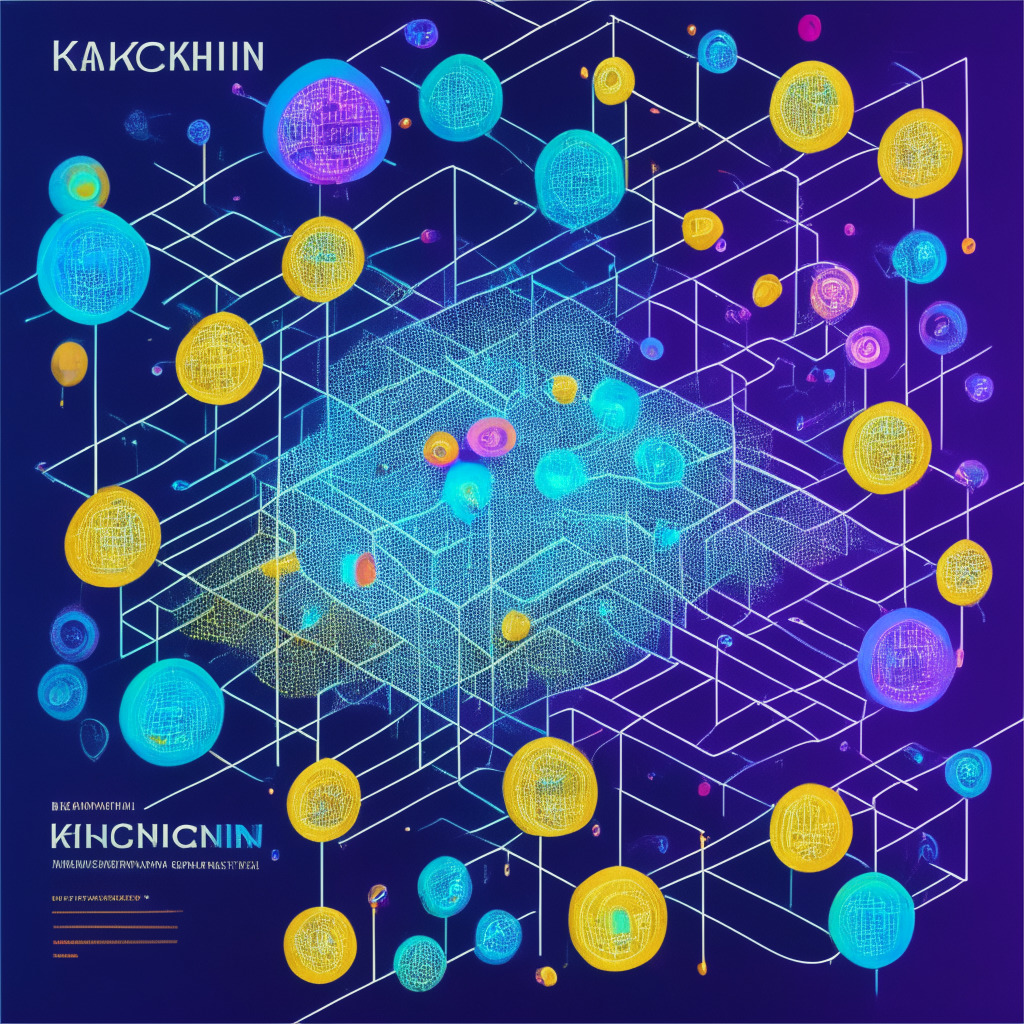“OKX executive, Lennix Lai, emphasized the role KYC plays in raising compliance standards in cryptocurrency exchanges. Though necessary for safeguarding customer interests, stricter compliance standards may erode cryptocurrency’s core ideologies of decentralization, privacy, and financial sovereignty, placing potential burden on startups.”
Search Results for: KYC
From Crypto Anarchy to Strict KYC: Is Privacy in the Blockchain Industry at Risk?
Gracy Chen, MD at crypto exchange Bitget, suggests KYC measures might get stricter with users undergoing ID verification perhaps more than once a year. Incorporating biometrics such as facial recognition, fingerprints, or iris scans, into KYC procedures is also gaining traction. Bitget has made KYC mandatory, reflecting a trend in crypto industry’s commitment to transparency and anti-fraud regulations. Chen also stresses the importance of balancing security and privacy, highlighting the role AI can play in enhancing AML capabilities.
KYC Regulations vs Permissionless Money: The Crypto Crossroads Unveiled by Tornado Cash Crisis
“The recent arrest of Tornado Cash founders has raised questions about the coexistence of KYC regulations and permissionless money. With platforms like Bitcoin’s Lightning Network and MetaMask allowing near-traceless transactions, the intrusion of KYC challenges the decentralization and anonymity that cryptocurrencies offer. This situation brings the future of crypto at a crossroads between regulatory vigilance and sector’s initial ethos.”
Bitget Enhances Security with Revised KYC: What it means for Crypto Trading
“Bitget revised its Know Your Customer (KYC) guidelines in a move to align with international regulatory standards, providing a secure environment for crypto trading. From September 2023, new users will need to complete level 1 KYC verification to avail Bitget’s services, emphasizing its adaptability to evolving regulatory parameters. Existing users have until October 1, 2023, for compliance.”
Bitget Imposes Stricter KYC: Enhancing Security or Limiting Genuine Crypto Enthusiasts?
“Singapore-based cryptocurrency exchange, Bitget plans to implement stricter know-your-customer (KYC) protocols from September 1 to quell perceived leniency and potential financial crimes. New users will need to pass level 1 KYC verification, including identity and facial confirmation, otherwise trading rights may be lost.”
Sandbox’s Adoption of KYC Measures: Boosting Security or Compromising Anonymity?
Sandbox, a renowned metaverse platform, has initiated Know Your Customer (KYC) measures in line with protocol staking. Staking users must complete a verification process, a move intended to improve security and compliance. Animoca Brands expressed optimism about Hong Kong’s changing blockchain attitudes amidst ongoing SEC allegations.
Senator Warren’s Anti-Crypto Agenda: How KYC & AML Challenges Can Make or Break Blockchain
The “anti-crypto army” led by US Senator Elizabeth Warren has intensified scrutiny on the blockchain industry, citing concerns over financial crime and national security. The crypto community fears that a broad regulatory approach may hinder the industry’s growth and undermine decentralization aspects of Web3.
Bridging the Gap for the Unbanked: Azteco’s Bitcoin Vouchers and the Debate on KYC Regulations
Azteco, a Bitcoin payments firm, receives $6 million seed funding led by Jack Dorsey to simplify Bitcoin purchasing for unbanked populations through a unique voucher system. The system aims to address financial management, money transfer, and credit access issues for over two billion unbanked individuals worldwide.
Deloitte Integrates KILT Blockchain: A Revolution in KYC & KYB Verification Processes?
Deloitte has integrated with KILT blockchain, a Polkadot parachain, to streamline Know Your Customer (KYC) and Know Your Business (KYB) verification processes using reusable digital credentials. This allows users control over their data and enhances security, efficiency, and scalability.
Deloitte Partners with KILT to Revolutionize KYC & KYB: Efficiency vs Privacy Concerns
Deloitte Consulting AG partners with Polkadot parachain KILT to streamline KYC and KYB procedures with reusable digital credentials, improving user control and data privacy. The collaboration could transform industries like e-commerce, DeFi, and gaming with enhanced convenience, cost efficiency, and security.
Balancing Anonymity & Compliance: Crypto’s Struggle with KYC/AML Regulations and Decentralization
The crypto sector faces the challenge of balancing anonymity and compliance with U.S. regulators demanding adherence to KYC and AML regulations. Blockchain’s future may lean towards AML/KYC compliance to attract institutional investors, while some decentralized protocols may resist due to privacy ideals. The balance between anonymity and compliance is crucial for the crypto sector’s growth and success.
Coinbase Lawsuit & The Great Biometric Privacy Debate: Risks vs. KYC Compliance
Coinbase faces a proposed class-action lawsuit for allegedly violating Illinois’ Biometric Information Privacy Act (BIPA) by collecting and storing customers’ fingerprints and facial templates without proper permission. The lawsuit raises concerns about exposure to privacy risks and potential identity theft if the exchange’s biometric database is breached.
Balancing KYC Compliance and Biometric Privacy: Lessons from the Coinbase Lawsuit
A proposed class-action lawsuit against Coinbase highlights the importance of securing user data and balancing biometric information collection with privacy concerns. Ensuring KYC compliance is crucial, but maintaining user trust and adhering to privacy laws are equally important for the future stability and growth of the blockchain and cryptocurrency sectors.
Mega Dice’s Million Dollar Boom: A Blessing or a Curse for Decentralized Casino Future?
The casino Mega Dice has recently attracted attention with a player winning $1 million. This is promoting the potential of the decentralized gaming industry and rationalizing the benefits over traditional counterparts. However, some concerns arise over potential problem gambling due to the platform’s ease of play and minimal KYC protocols. Mega Dice offers assurances with strict EU Anti-Money Laundering rules and constant user assistance.
Exploring the Growth Surge of Toncoin and the Entry of TG.Casino in GambleFi Market
“There has been increased interest in the Open Network’s Toncoin with a 5% rise after a minor retracement from an uptrend resistance. Despite recent downturns, Toncoin maintained its high trading within its channel, demonstrating robust consolidation strategies. Meanwhile, TG.Casino, utilizing blockchain technology, sets a new benchmark for GambleFi, ensuring secure and convenient gaming experiences.”
Decentralized Exchanges: The New Frontier for Money Laundering or a Catalyst for Blockchain Integrity?
“Illicit funds” totaling $7 billion have been laundered through Decentralized Exchanges, cross-chain bridges and non-KYC exchanges, surpassing Elliptic’s predictions. Complex methods like derivatives trading and limit orders provide obscurity for money laundering schemes, with $2.7 billion laundered from July 2022 to 2023.
Regulatory Dilemma: Hong Kong’s Caution vs. UK’s Opportunity in Crypto Oversight
As the global crypto landscape evolves, regulators are trying to create market control measures. Concerns are raised around stablecoins’ volatility due to reserve management. Regulatory approaches differ worldwide, with the UK aiming to improve Web3 regulation, by refining their KYC practices using innovation like blockchain analytics. However, they’ve also shown a strict attitude towards the industry. Striking a balance between industry growth and investor protection is a ongoing struggle for regulatory authorities.
Pivotal Move: How the UK’s Regulatory Changes Could Shape the Global Crypto Landscape
“The United Kingdom could potentially leapfrog the US in Web3 crypto environments, contingent on an unconventional regulatory trajectory. Changes like curbing liabilities for DAO token holders and amending FCA’s KYC guidelines could catalyze growth in emerging technologies. Nonetheless, the crypto evolution is challenged by potential misuse and regulatory hurdles.”
Skyrocketing DeFi Tokens BDOGE and FROGGY: Rollercoaster Rides and the Rising Star of GambleFi
DeFi exchanged tokens, BDOGE and FROGGY, showed significant growth in October. BDOGE saw a +5,383% rise due to a $1 million influx in trading volume, but later saw an -89.60% slump. FROGGY, another token, rallied +4,204%, then +643%, hinting at a possible second rally. TG Casino, a GambleFi project leveraging blockchain’s decentralization, also gains attention. Any investment decisions in cryptocurrency, including TG Casino, however, necessitate detailed research.
Binance Exodus: Why Russian Clients are Migrating en Masse to CommEx and Other Platforms
“Binance’s Russian users are progressively moving to new platforms including CommEx and ByBit, evident from decreased p2p transactions. While the migration is linked to US regulatory pressures, the change may indicate a strategic rebranding for more compliant user interaction in crypto market scenarios.”
Telegram’s Blockchain-based Super-App: An Encroaching Security or Blessing in Disguise?
“Telegram’s Open Network (TON) has received major investment from MEXC exchange, aiming to enhance TON’s role in shaping Telegram’s journey towards becoming a Web3 super-app. However, concerns over security measures are being raised given the potential risks posed by blockchain platforms and crypto transactions.”
Bitcoin’s Resurgence and Emergence of TG.Casino: A Double Whammy in the Crypto World
“Polygon has seen a 17% increase in high-value transactions, in line with the unveiling of key governance proposals. However, its Relative Strength Index indicates potential need for consolidation. Additionally, TG.Casino emerges as an exciting entity, linking casino industry with decentralized blockchain capabilities, offering both opportunities and challenges in the cryptocurrency future.”
Elderly Frontman in South Korea’s Sophisticated Bitcoin ‘Phishing’ Scam: Wellspring for Preventive Measures
In this South Korean case, a septuagenarian was unknowingly involved in a Bitcoin scam, purchasing Bitcoin on behalf of the fraudsters to maintain their anonymity. The incident highlights the increase in crypto-related scams, particularly targeting older victims and underlining the need for a thorough understanding and vigilance in the crypto space.
TG.Casino’s Debut on Telegram: The Future of Web3 Gambling or a Risky Bet?
TG.Casino, a new web3 gambling venture, has debuted on Telegram, gathering $250,000 in just one week for its presale event. Combining user-friendly features like instant deposits, no-KYC transactions and Telegram automation, they aim to democratize next-generation GambleFi, just as Unibot democratized advanced crypto trading.
Unveiling the Shadows: Binance Russia’s Acquisition by CommEx Raises Intriguing Questions
Binance Russia has been acquired by an obscure firm, CommEx, whose owners’ identity remains a mystery. However, CommEx has been busy building its platform independently while employing several ex-Binance staff. The debate about the real ownership of CommEx continues to heat up due to their adamant secrecy.
Pepe Coin’s Resurgence Vs The Rise of TG.Casino: Navigating the Crypto Gaming Space
While Pepe Coin (PEPE) recently saw a 5% rise and a 91% increase in trading volume, its future remains uncertain with potential resistance looming. On the other hand, TG.Casino ($TGC), a budding crypto gaming ecosystem, offers promising growth with robust encryption, a functional token system and swapping capabilities, urging prospective investors to look closely at the disrupting token’s merits.
Hong Kong’s Controversial Stance on Crypto: Safety Measures or Hindrance to Mass Adoption?
“Hong Kong-based crypto exchange Hashkey HK has started trading Avalanche (AVAX) but with a specific condition – only professional investors with a portfolio exceeding $1 million can trade AVAX. Hashkey HK mandates users deposit $1,500 for KYC verification.”
Binance’s Exit and CommEx’s Entrance: The Mysterious Shift of Crypto Operations in Russia
“Binance has exited Russia, selling to newcomer CommEx. Despite little detail about CommEx’s origins, it is registered in Seychelles serving CIS and Asian clientele. Its initial focus is on P2P transactions in Russia with goals to rapidly expand as a cryptocurrency exchange.”
Belgian Crypto Marker Keyrock Wins Approval from Swiss Regulator: A Leap or a Slip in Crypto’s Decentralized Vision?
“Belgian-based crypto market maker Keyrock achieved regulatory clearance from the Swiss Financial Services Standards Association after a thorough inspection confirmed compliance with antimoney laundering requirements. This endorsement, alongside expansion plans and a secured $72 million in funding, indicates Keyrock’s commitment to transparency, regulatory compliance, and the evolution of the crypto landscape.”
Decoding Vitalik Buterin’s Privacy Pool Concept: Navigating Blockchain Privacy & Regulatory Compliance
Ethereum co-founder Vitalik Buterin’s proposed privacy pool concept focuses on combining blockchain privacy and regulatory compliance, sparking meaningful discussion in the crypto world. However, concerns over unclear compliance framework, implementation struggles, and acceptance issues remain to be addressed.
Rollbit Coin’s Sudden Dip: An Alarming Future or A Temporary Setback?
“Rollbit Coin (RLB) has seen a 40% decline amidst lowered trading volumes, alarming investors. Technical analysis signals caution as oversold RSI, shrinking volumes, and support instability make predictions challenging. Meanwhile, TG.Casino, a blockchain-based online gambling platform, launches with promise, aiming to raise $10 million.”
TG.Casino’s Game-Changing Token Pre-Sale: Future of Crypto Gambling and Where Investors Stand
TG.Casino, a leading Telegram-based casino, has launched a pre-sale for its tokens, $TGC, amassing $140,000 within minutes. The casino stands out with anonymous and instant Web3 deposits, robust security, and no-KYC access. TG.Casino aims to generate $5 million from its token supply, using profits to maintain price stability and boost potential growth.































